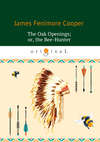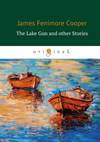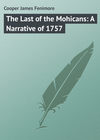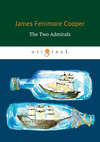Loe raamatut: «Mercedes of Castile: or, The Voyage to Cathay», lehekülg 13
"These are cheerful tidings, Martin Alonzo" – eagerly put in the friar, "and thy soul, and the souls of all who belong to you, will reap the benefits of this manly and pious resolution. It is one thing, Señor Almirante, to have their Highnesses of your side, in a place like Palos, and another to have our worthy neighbor Pinzon, here; for, if they are sovereigns in law, he is an emperor in opinion. I doubt not that the caravels will now be speedily forthcoming."
"Since thou seemest to have truly resolved to enter into our enterprise, Señor Martin Alonzo," added Columbus, with his dignified gravity, "out of doubt, thou hast well bethought thee of the conditions, and art come prepared to let them be known. Do they savor of the terms that have already been in discussion between us?"
"Señor Admiral, they do; though gold is not, just now, as abundant in our purses, as when we last discoursed on this subject. On that head, some obstacles may exist, but on all others, I doubt not, a brief explanation between us will leave the matter free from doubt."
"As to the eighth, for which I stand committed with their Highnesses, Señor Pinzon, there will be less reason, now, to raise that point between us, than when we last met, as other means may offer to redeem that pledge" – as Columbus spoke, his eyes involuntarily turned toward the pretended Pedro, whither those of Martin Alonzo Pinzon significantly followed; "but there will be many difficulties to overcome with these terrified and silly mariners, which may yield to thy influence. If thou wilt come with me into this chamber, we will at once discuss the heads of our treaty, leaving this youth, the while, to the hospitality of our reverend friend."
The prior raising no objection to this proposition, it was immediately put in execution, Columbus and Pinzon withdrawing to a more private apartment, leaving Fray Juan Perez alone with our hero.
"Then thou thinkest seriously, son, of making one in this great enterprise of the admiral's," said the Franciscan, as soon as the door was closed on those who had just left them, eyeing Luis, for the first time, with a more strict scrutiny than hitherto he had leisure to exercise. "Thou carriest thyself much like the young lords of the court, and wilt have occasion to acquire a less towering air in the narrow limits of one of our Palos caravels."
"I am no stranger to Nao, Carraca, Fusta, Pinaza, Carabelon, or Felucca, holy prior, and shall carry myself with the admiral, as I should carry myself before Don Fernando of Aragon, were he my fellow-voyager, or in the presence of Boabdil of Grenada, were that unhappy monarch again seated on the throne from which he hath been so lately hurled, urging his chivalry to charge the knights of Christian Spain."
"These are fine words, son, ay, and uttered with a tilting air, if truth must be said; but they will avail thee nothing with this Genoese, who hath that in him, that would leave him unabashed even in the presence of our gracious lady, Doña Isabella, herself."
"Thou knowest the queen, holy monk?" inquired Luis, forgetting his assumed character, in the freedom of his address.
"I ought to know her inmost heart, son, for often have I listened to her pure and meek spirit, in the secrets of the confessional. Much as she is beloved by us Castilians, no one can know the true, spiritual elevation of that pious princess, and most excellent woman, but they who have had occasion to shrive her."
Don Luis hemmed, played with the handle of his rapier, and then gave utterance to the uppermost thought, as usual.
"Didst thou, by any chance of thy priestly office, father, ever find it necessary to confess a maiden of the court, who is much esteemed by the queen?" he inquired, "and whose spirit, I'll answer for it, is as pure as that of Doña Isabella's itself."
"Son, thy question denoteth greater necessity for repairing to Salamanca, in order to be instructed in the history, and practices, and faith of the church, than to be entering into an enterprise, even as commendable as this of Colon's! Dost thou not know that we churchmen are not permitted to betray the secrets of the confessional, or to draw comparisons between penitents? and, moreover, that we do not take even Doña Isabella, the blessed Maria keep her ever in mind, as the standard of holiness to which all Christians are expected to aim? The maiden of whom thou speakest may be virtuous, according to worldly notions, and yet a grievous sinner in the eyes of mother church."
"I should like, before I quit Spain, to hear a Mendoza, or a Guzman, who hath not a shaven crown, venture to hint as much, most reverend prior!"
"Thou art hot and restive, and talkest idly, son; what would one like thee find to say to a Guzman, or a Mendoza, or a Bobadilla, even, did he affirm what thou wishest? But, who is the maid, in whom thy feelings seem to take so deep, although I question if it be not an unrequited, interest?"
"Nay, I did but speak in idleness. Our stations have made such a chasm between us, that it is little likely we should ever come to speech; nor is my merit such as would be apt to cause her to forget her high advantages."
"Still, she hath a name?"
"She hath, truly, prior, and a right noble one it is. I had the Doña Maria de las Mercedes de Valverde in my thoughts, when the light remark found utterance. Haply, thou may'st know that illustrious heiress?"
Fray Juan Perez, a truly guileless priest, started at the name; then he gazed intently, and with a sort of pity, at the youth; after which he bent his head toward the tiles beneath his feet, smiled, and shook his head like one whose thoughts were very active.
"I do, indeed, know the lady," he said, "and even when last at court, on this errand of Colon's, their own confessor being ill, I shrived her, as well as my royal mistress. That she is worthy of Doña Isabella's esteem is true; but thy admiration for this noble maiden, which must be something like the distant reverence we feel for the clouds that sail above our heads, can scarce be founded on any rational hopes."
"Thou canst not know that, father. If this expedition end as we trust, all who engage in it will be honored and advanced; and why not I, as well as another?"
"In this, thou may'st utter truth, but as for the Doña – " The Franciscan checked himself, for he was about to betray the secret of the confessional. He had, in truth, listened to the contrition of Mercedes, of which her passion for Luis was the principal cause; and it was he who, with a species of pious fraud of which he was himself unconscious, had first pointed out the means by which the truant noble might be made to turn his propensity to rove to the profit of his love; and his mind was full of her beautiful exhibition of purity and natural feeling, nearly even to overflowing. But habit and duty interfered in time, and he did not utter the name that had been trembling on his lips. Still, his thoughts continued in this current, and his tongue gave utterance to that portion of them which he believed to be harmless. "Thou hast been much about the world, it would seem, by Master Alonzo's greeting," he continued, after a short pause; "didst ever meet, son, with a certain cavalier of Castile, named Don Luis de Bobadilla – a grandee, who also bears the title of Conde de Llera?"
"I know little of his hopes, and care less for his titles," returned Luis, calmly, who thought he would manifest a magnanimous indifference to the Franciscan's opinions – "but I have seen the cavalier, and a roving, mad-brained, graceless youth it is, of whom no good can be expected."
"I fear this is but too true," rejoined Fray Juan Perez, shaking his head in a melancholy manner – "and yet they say he is a gallant knight, and the very best lance in all Spain."
"Ay, he may be that," answered Luis, hemming a little louder than was decorous, for his throat began to grow husky – "Ay, he may be that; but of what avail is a good lance without a good character. I hear little commendable of this young Conde de Llera."
"I trust he is not the man he generally passeth for," – answered the simple-hearted monk, without in the least suspecting his companion's disguise; "and I do know that there are some who think well of him – nay, whose existence, I might say whose very souls, are wrapped up in him!"
"Holy Franciscan! – why wilt thou not mention the names of one or two of these?" demanded Luis, with an impetuosity that caused the prior to start.
"And why should I give this information to thee, young man, more than to another?"
"Why, father – why, for several most excellent and unanswerable reasons. In the first place, I am a youth myself, as thou seest; and example, they say, is better than precept. Then, too, I am somewhat given to roving, and it may profit me to know how others of the same propensity have sped. Moreover, it would gladden my inmost heart to hear that – but two sufficient reasons are better than three, and thou hast the first number already."
Fray Juan Perez, a devout Christian, a learned churchman, and a liberal scholar, was as simple as a child in matters that related to the world and its passions. Nevertheless, he was not so dull as to overlook the strange deportment and stranger language of his companion. A direction had been given to his thoughts by the mention of the name of our heroine; and, as he himself had devised the very course taken by our hero, the truth began to dawn on his imagination.
"Young cavalier," he exclaimed, "thou art Don Luis de Bobadilla!"
"I shall never deny the prophetic knowledge of a churchman, worthy father, after this detection! I am he thou sayest, entered on this expedition to win the love of Mercedes de Valverde."
"'Tis as I thought – and yet, Señor, you might have taken our poor convent less at an advantage. Suffer that I command the lay brothers to place refreshments before you!"
"Thy pardon, excellent prior – Pedro de Muños, or even Pero Gutierrez, hath no need of food; but, now that thou knowest me, there can be less reason for not conversing of the Doña Mercedes?"
"Now that I know thee, Señor Conde, there is greater reason for silence on that head," returned Fray Juan Perez, smiling. "Thine aunt, the most esteemed and virtuous lady of Moya, can give thee all occasion to urge thy suit with this charming maiden, and it would ill become a churchman to temper her prudence by any indiscreet interference."
This explanation was the commencement of a long and confidential dialogue, in which the worthy prior, now that he was on his guard, succeeded in preserving his main secret, though he much encouraged the young man in the leading hope of his existence, as well as in his project to adhere to the fortunes of Columbus. In the mean while, the great navigator himself continued closeted with his new counsellor; and when the two reappeared, it was announced to those without that the latter had engaged in the enterprise with so much zeal, that he actually entertained the intention of embarking on board of one of the caravels in person.
CHAPTER XII
"Yet he to whom each danger hath become
A dark delight, and every wild a home,
Still urges onward – undismayed to tread
Where life's fond lovers would recoil with dread."
The Abencerrage.
The intelligence that Martin Alonzo Pinzon was to make one of the followers of Colon, spread through the village of Palos like wild-fire. Volunteers were no longer wanting; the example of one known and respected in the vicinity, operating far more efficiently on the minds of the mariners, than the orders of the queen or the philosophy of Columbus. Martin Alonzo they knew; they were accustomed to submit to his influence; they could follow in his footsteps, and had confidence in his judgment; whereas, the naked orders of an unseen sovereign, however much beloved, had more of the character of a severe judgment than of a generous enterprise; and as for Columbus, though most men were awed by his dignified appearance and grave manner, when out of sight he was as much regarded as an adventurer at Palos, as he had been at Santa Fé.
The Pinzons set about their share of the expedition after the manner of those who were more accustomed to execute than to plan. Several of the family entered cordially into the work; and a brother of Martin Alonzo's, whose name was Vincente Yañez, also a mariner by profession, joined the adventurers as commander of one of the vessels, while another took service as a pilot. In short, the month that succeeded the incidents just mentioned, was actively employed, and more was done in that short space of time toward bringing about a solution of the great problem of Columbus, than had been accomplished, in a practical way, during the seventeen long years that the subject had occupied his time and engrossed his thoughts.
Notwithstanding the local influence of the Pinzons, a vigorous opposition to the project still existed in the heart of the little community that had been chosen for the place of equipment of the different vessels required. This family had its enemies as well as its friends, and, as is usual with most human undertakings, two parties sprang up, one of which was quite as busily occupied in thwarting the plans of the navigator, as the other was engaged in promoting them. One vessel had been seized for the service, under the order of the court, and her owners became leaders of the dissatisfied faction. Many seamen, according to the usage of that day, had been impressed for duty on this extraordinary and mysterious voyage; and, as a matter of course, they and their friends were not slow to join the ranks of the disaffected. Much of the necessary work was found to be imperfectly done; and when the mechanics were called on to repair these omissions, they absconded in a body. As the time for sailing approached, the contention grew more and more violent, and even the Pinzons had the mortification of discovering that many of those who had volunteered to follow their fortunes, began to waver, and that some had unequivocally deserted.
Such was the state of things, toward the close of the month of July, when Martin Alonzo Pinzon again repaired to the convent of Santa Maria de Rabida, where Columbus continued to pass most of the time that was not given to a direct personal superintendence of the preparations, and where Luis de Bobadilla, who was altogether useless in the actual condition of affairs, also passed many a weary hour, chafing for active duty, and musing on the loveliness, truth, and virtues of Mercedes de Valverde. Fray Juan Perez was earnest in his endeavors to facilitate the execution of the objects of his friends, and he had actually succeeded, if not in absolutely suppressing the expression of all injurious opinion on the part of the less enlightened of the brotherhood, at least in rendering the promulgation of them more cautious and private.
When Columbus and the prior were told that the Señor Pinzon sought an interview, neither was slow in granting the favor. As the hour of departure drew nigh, the importance of this man's exertions became more and more apparent, and both well knew that the royal protection of Isabella herself, just at that moment and in that place, was of less account than that of this active mariner. The Señor Pinzon, therefore, had not long to wait for his audience, having been ushered into the room that was commonly occupied by the zealous Franciscan, almost as soon as his request was preferred.
"Thou art right welcome, worthy Martin Alonzo!" exclaimed the prior, the moment he caught a glimpse of the features of his old acquaintance – "How get on matters at Palos, and when shall we have this holy undertaking in a fair direction for success?"
"By San Francisco, reverend prior, that is more than it will be safe for any man to answer. I have thought we were in a fair way to make sail, a score of times, when some unforeseen difficulty hath arisen. The Santa Maria, on board which the admiral and the Señor Gutierrez, or de Muños, if he will have it so, will embark, is already fitted. She may be set down as a tight craft, and somewhat exceedeth a hundred tons in burthen, so that I trust his excellency, and all the gallant cavaliers who may accompany him, will be as comfortable as the holy monks of Rabida – more especially as the good caravel hath a deck."
"These are, truly, glad tidings," returned the prior, rubbing his hands with delight – "and the excellent craft hath really a deck! Señor Almirante, thou mayst not be in a vessel that is altogether worthy of thy high aim, but, on the whole, thou wilt be both safe and comfortable, keeping in view, in particular, this convenient and sheltering deck."
"Neither my safety nor my convenience is a consideration to be mentioned, friend Juan Perez, when there is question of so much graver matters. I rejoice that thou hast come to the convent this morning, Señor Martin Alonzo, as, being about to address letters to the court, by means of an especial courier, I desire to know the actual condition of things. Thou thinkest the Santa Maria will be in a state for service by the end of the month?"
"Señor, I do. The ship hath been prepared with due diligence, and will conveniently hold some three score, should the panic that hath seized on so many of the besotted fools of Palos, leave us that number, who may still be disposed to embark. I trust that the saints look upon our many efforts, and will remember our zeal when we shall come to a joint division of the benefits of this undertaking, which hath had no equal in the history of navigation!"
"The benefits, honest Martin Alonzo, will be found in the spread of the church's dominion, and the increased glory of God!" put in the prior, significantly.
"Out of all question, holy Fray Juan Perez – this is the common aim; though I trust it is permitted to a pains-taking mariner to bethink him of his wife and children, in discreet subordination to those greater ends. I have much mistaken the Señor Colon, if he do not look for some little advantage, in the way of gold, from this visit to Cathay."
"Thou hast not mistaken me, honest Martin Alonzo," returned Columbus, gravely. "I do, indeed, expect to see the wealth of the Indies pouring into the coffers of Castile, in consequence of this voyage. In sooth, excellent prior, in my view, the recovery of the holy sepulchre is dependent mainly on the success of our present undertaking, in the way of a substantial worldly success."
"This is well, Señor Admiral," put in Martin Alonzo, a little hastily, "and ought to gain us great favor in the eyes of all good Christians – more especially with the monks of la Rabida. But it is hard enough to persuade the mariners of the port to obey the queen, in this matter, and to fulfil their engagements with ourselves, without preaching a crusade, as the best means of throwing away the few maravedis they may happen to gain by their hardships and courage. The worthy pilots, Francisco Martin Pinzon, mine own brother, Sancho Ruiz, Pedro Alonzo Niño, and Bartolemeo Roldan, are all now firmly tied to us by the ropes of the law; but should they happen to find a crusade at their end, all the saints in the calendar would scarce have influence to make them hesitate about loosening themselves from the agreement."
"I hold no one but myself bound to this object," returned Columbus, calmly. "Each man, friend Martin Alonzo, will be judged by his own deeds, and called on to fulfil his own vows. Of those who pledge naught, naught will be exacted, and naught given at the great final account of the human race. But what are the tidings of the Pinta, thine own vessel? Hath she been finally put into a condition to buffet the Atlantic?"
"As ever happeneth with a vessel pressed into the royal service, Señor, work hath gone on heavily, and things in general have not borne that merry activity which accompanieth the labor of those who toil of a free will, and for their own benefit."
"The silly mariners have toiled in their own behalf, without knowing it," observed Columbus. "It is the duty of the ignorant to submit to be led by the more enlightened, and to be grateful for the advantages they derive from a borrowed knowledge, albeit it is obtained contrary to their own wishes."
"That is it, truly," added the prior; "else would the office of us churchmen be reduced to very narrow limits. Faith – faith in the church – is the Christian's earliest and latest duty."
"This seemeth reasonable, excellent sirs," returned Master Alonzo, "though the ignorant find it difficult to comprehend matters that they do not understand. When a man fancieth himself condemned to an unheard-of death, he is little apt to see the benefit that lieth beyond the grave. Nevertheless, the Pinta is more nearly ready for the voyage, than any other of our craft, and hath her crew engaged to a man, and that under contracts that will not permit much dispute before a notary."
"There remaineth only the Niña, then," added Columbus; "with her prepared, and our religious duties observed, we may hope finally to commence the enterprise!"
"Señor, you may. My brother, Vicente Yañez, hath finally consented to take charge of this little craft; and that which a Pinzon promiseth, a Pinzon performeth. She will be ready to depart with the Santa Maria and the Pinta, and Cathay must be distant, indeed, if we do not reach it with one or the other of our vessels."
"This is right encouraging, neighbor Martin Alonzo," returned the friar, rubbing his hands with delight; "and I make no question all will come round in the end. What say the crones and loose talkers of Moguer, and of the other ports, touching the shape of the earth, and the chances of the admiral's reaching the Indies, now-a-days?"
"They discourse much as they did, Fray Juan Perez, idly and without knowledge. Although there is not a mariner in any of the havens who doth not admit that the upper sails, though so much the smallest, are the first seen on the ocean, yet do they deny that this cometh of the shape of the earth, but, as they affirm, of the movements of the waters."
"Have none of them ever observed the shadows cast by the earth, in the eclipses of the moon?" asked Columbus, in his calm manner, though he smiled, even in putting the question, as one smiles who, having dipped deeply into a natural problem himself, carelessly lays one of its more popular proofs before those who are less disposed to go beneath the surface. "Do they not see that these shadows are round, and do they not know that a shadow which is round can only be cast by a body that is round?"
"This is conclusive, good Martin Alonzo," put in the prior, "and it ought to remove the doubts of the silliest gossip on the coast. Tell them to encircle their dwellings, beginning to the right, and see if, by following the walls, they do not return to the spot from which they started, coming in from the left."
"Ay, reverend prior, if we could bring our distant voyage down to these familiar examples, there is not a crone in Moguer, or a courtier at Seville, that might not be made to comprehend the mystery. But it is one thing to state a problem fairly, and another to find those who can understand it. Now, I did give some such reasoning to the Alguiazil, in Palos here, and the worthy Señor asked me if I expected to return from this voyage by the way of the lately captured town of Granada. I fancy that the easiest method of persuading these good people to believe that Cathay can be reached by the western voyage, will be by going there and returning."
"Which we will shortly do, Master Martin Alonzo," observed Columbus, cheerfully – "But the time of our departure draweth near, and it is meet that none of us neglect the duties of religion. I commend thee to thy confessor, Señor Pinzon, and expect that all who sail with me, in this great enterprise, will receive the holy communion in my company, before we quit the haven. This excellent prior will shrive Pedro de Muños and myself, and let each man seek such other holy counsellor and monitor as hath been his practice."
With this intimation of his intention to pay a due regard to the rites of the church before he departed – rites that were seldom neglected in that day – the conversation turned, for the moment, on the details of the preparations. After this the parties separated, and a few more days passed away in active exertions.
On the morning of Thursday, August the second, 1492, Columbus entered the private apartment of Fray Juan Perez, habited like a penitent, and with an air so devout, and yet so calm, that it was evident his thoughts were altogether bent on his own transgressions and on the goodness of God. The zealous priest was in waiting, and the great navigator knelt at the feet of him, before whom Isabella had often knelt, in the fulfilment of the same solemnity. The religion of this extraordinary man was colored by the habits and opinions of his age, as, indeed, in a greater or less degree, must be the religion of every man; his confession, consequently, had that admixture of deep piety with inconsistent error, that so often meets the moralist in his investigations into the philosophy of the human mind. The truth of this peculiarity will be seen, by adverting to one or two of the admissions of the great navigator, as he laid before his ghostly counsellor the catalogue of his sins.
"Then, I fear, holy father," Columbus continued, after having made most of the usual confessions touching the more familiar weaknesses of the human race, "that my mind hath become too much exalted in this matter of the voyage, and that I may have thought myself more directly set apart by God, for some good end, than it might please his infinite knowledge and wisdom to grant."
"That would be a dangerous error, my son, and I carefully admonish thee against the evils of self-righteousness. That God selecteth his agents, is beyond dispute; but it is a fearful error to mistake the impulses of self-love, for the movements of his Divine Spirit! It is hardly safe for any who have not received the church's ordination, to deem themselves chosen vessels."
"I endeavor so to consider it, holy friar," answered Columbus, meekly; "and, yet, there is that within, which constantly urgeth to this belief, be it a delusion, or come it directly from heaven. I strive, father, to keep the feeling in subjection, and most of all do I endeavor to see that it taketh a direction that may glorify the name of God and serve the interests of his visible church."
"This is well, and yet do I feel it a duty to admonish thee against too much credence in these inward impulses. So long as they tend, solely, to increase thy love for the Supreme Father of all, to magnify his holiness, and glorify his nature, thou may'st be certain it is the offspring of good; but when self-exaltation seemeth to be its aim, beware the impulse, as thou wouldst eschew the dictation of the great father of evil!"
"I so consider it; and now having truly and sincerely disburdened my conscience, father, so far as in me lieth, may I hope for the church's consolation, with its absolution?"
"Canst thou think of naught else, son, that should not lie hid from before the keeper of all consciences?"
"My sins are many, holy prior, and cannot be too often or too keenly rebuked; but I do think that they may be fairly included in the general heads that I have endeavored to recall."
"Hast thou nothing to charge thyself with, in connection with that sex that the devil as often useth as his tempters to evil, as the angels would fain employ them as the ministers of grace?"
"I have erred as a man, father; but do not my confessions already meet those sins?"
"Hast thou bethought thee of Doña Beatriz Enriquez? of thy son Fernando, who tarrieth, at this moment, in our convent of la Rabida?"
Columbus bowed his head in submission, and the heavy sigh, amounting almost to a groan, that broke out of his bosom, betrayed the weight of his momentary contrition.
"Thou say'st true, father; that is an offence which should never be forgotten, though so often shrived since its commission. Heap on me the penance that I feel is due, and thou shalt see how a Christian can bend and kiss the rod that he is conscious of having merited."
"The spirit thus to do is all that the church requireth; and thou art now bent on a service too important to her interests to be drawn aside from thy great intentions, for any minor considerations. Still may not a minister of the altar overlook the offence. Thou wilt say a pater, daily, on account of this great sin, for the next twenty days, all of which will be for the good of thy soul; after which the church releaseth thee from this especial duty, as thou wilt, then, be drawing near to the land of Cathay, and may have occasion for all thy thoughts and efforts to effect thy object."
The worthy prior then proceeded to prescribe several light penances, most of which were confined to moderate increases of the daily duties of religion; after which he shrived the navigator. The turn of Luis came next, and more than once the prior smiled involuntarily, as he listened to this hot-blooded and impetuous youth, whose language irresistibly carried back his thoughts to the more meek, natural, and the more gentle admissions of the pure-minded Mercedes. The penance prescribed to Luis was not entirely free from severity, though, on the whole, the young man, who was not much addicted to the duties of the confessional, fancied himself well quit of the affair, considering the length of the account he was obliged to render, and the weight of the balance against him.
These duties performed in the persons of the two principal adventurers, Martin Alonzo Pinzon and the ruder mariners of the expedition appeared before different priests and gave in the usual reckoning of their sins. After this came a scene that was strictly characteristic of the age, and which would be impressive and proper, in all times and seasons, for men about to embark in an undertaking of a result so questionable.




















